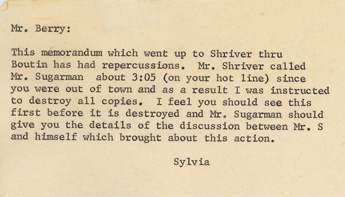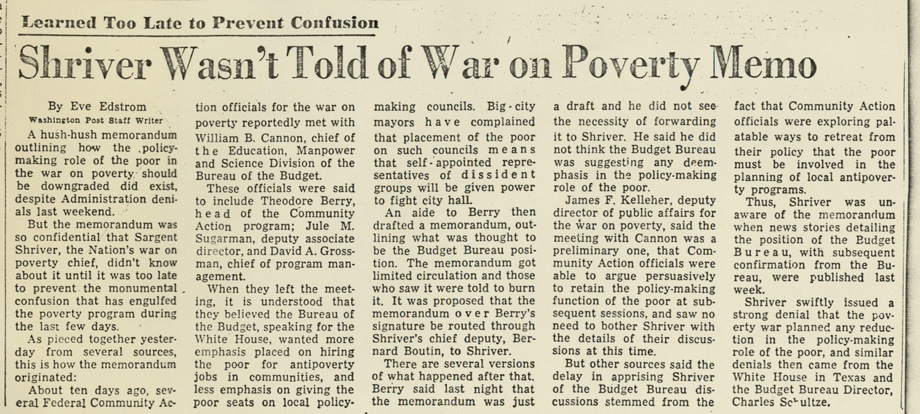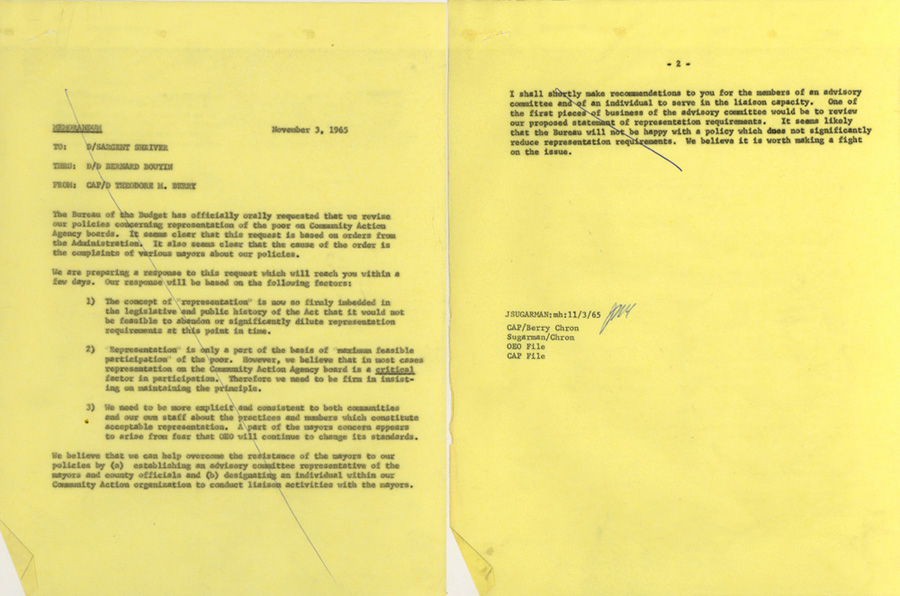By Laura Laugle
Thus far in the archival project of Theodore Berry’s papers I have found almost no controversy surrounding him or his career. This surprises me not only because he was a politician, a member of a group of people who seem completely unable to keep themselves out of trouble for any length of time, but also because he was an African-American holding high office in an already controversial federal agency, the Community Action Program, during the mid-late 1960s. That is, I’d found no controversy until I came across this article.
Essentially, the article explains that Ted Berry, then at the beginning of his tenure as the director of CAP, met with officials from the Bureau of the Budget who expressed their opinions that CAP should de-emphasize the role the poor should have in governing local policy. The meeting and CAP’s reaction to it were then outlined in a memorandum by an aide to Berry and circulated in the highest echelons of CAP and its parent agency, the Office of Economic Opportunity. The problem? Sargent Shriver, director of the OEO and Kennedy-by-marriage, never saw the memo, knew nothing of the meeting or any possible change in policy dictated by the Bureau of the Budget and generally made a fool of himself by denying the event entirely. The article accuses Berry of purposely keeping the information from Shriver, an accusation to which Berry apparently concedes, as well as trying to “retreat from their [CAP’s] policy that the poor must be involved in the planning of local antipoverty programs.”
 This kind of controversy is pretty tame compared to today’s seemingly never ending stream of influence-peddling and adultery scandals, but press like this could well have put Berry’s career in jeopardy only a few months after his appointment as CAP director. Fortunately for us, Berry’s secretary never did destroy his copies of the memorandum as instructed and the whole debacle was documented and saved with the rest of his papers in the Berry collection. It is clear from this and other drafts of the memo, all of which are clearly addressed to Sargent Shriver, that Berry never meant to keep him in the dark. (Though, I admit that I have no idea why he would say that he “did not see the necessity of forwarding it to Shriver,” as is reported in the article.) The problem could have been as simple as Shriver’s copy getting lost somewhere en route. It is also clear from the memo itself that Berry and CAP had no intention of giving in to whatever demands the Bureau of the Budget might have had about de-emphasizing representation of the poor on local policy-making councils. Berry said “We believe it is worth making a fight on the issue,” and in the end the White House backed him up.
This kind of controversy is pretty tame compared to today’s seemingly never ending stream of influence-peddling and adultery scandals, but press like this could well have put Berry’s career in jeopardy only a few months after his appointment as CAP director. Fortunately for us, Berry’s secretary never did destroy his copies of the memorandum as instructed and the whole debacle was documented and saved with the rest of his papers in the Berry collection. It is clear from this and other drafts of the memo, all of which are clearly addressed to Sargent Shriver, that Berry never meant to keep him in the dark. (Though, I admit that I have no idea why he would say that he “did not see the necessity of forwarding it to Shriver,” as is reported in the article.) The problem could have been as simple as Shriver’s copy getting lost somewhere en route. It is also clear from the memo itself that Berry and CAP had no intention of giving in to whatever demands the Bureau of the Budget might have had about de-emphasizing representation of the poor on local policy-making councils. Berry said “We believe it is worth making a fight on the issue,” and in the end the White House backed him up.
In 2010, the University of Cincinnati Libraries received a $61,287 grant from the National Historical Publications and Records Commission of the Archives and Records Administration to fully process the Theodore M. Berry Collection in the Archives & Rare Books Library. All information and opinions published on the Berry project website and in the blog entries are those of the individuals involved in the grant project and do not reflect those of the National Archives and Records Administration. We gratefully acknowledge the support of NARA.



